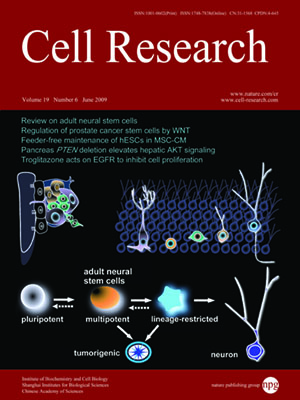
Volume 19, No 6, Jun 2009
ISSN: 1001-0602
EISSN: 1748-7838 2018
impact factor 17.848*
(Clarivate Analytics, 2019)
Volume 19 Issue 6, June 2009: 710-719
ORIGINAL ARTICLES
Pancreas-specific Pten deficiency causes partial resistance to diabetes and elevated hepatic AKT signaling
Zan Tong1, Yan Fan2, Weiqi Zhang1, Jun Xu1, Jing Cheng3, Mingxiao Ding1,4 and Hongkui Deng1,4
1Key Laboratory of Cell Proliferation and Differentiation of the Ministry of Education, College of Life Sciences, Peking University, Beijing 100871, China
2Key Laboratory of Bio-resource and Bio-environment, Ministry of Education, College of Life Science, Sichuan University, Chengdu 610064, China
3Beijing Laboratory Animal Research Center, Beijing 100012, China
4Laboratory of Chemical Genomics, Shenzhen Graduate School of Peking University, The University Town, Shenzhen 518055, China
Correspondence: Hongkui Deng,(hongkui_deng@pku.edu.cn )
PTEN, a negative regulator of the phosphatidylinositol-3-kinase/AKT pathway, is an important modulator of insulin signaling. To determine the metabolic function of pancreatic Pten, we generated pancreas-specific Pten knockout (PPKO) mice. PPKO mice had enlarged pancreas and elevated proliferation of acinar cells. They also exhibited hypoglycemia, hypoinsulinemia, and altered amino metabolism. Notably, PPKO mice showed delayed onset of streptozotocin (STZ)-induced diabetes and sex-biased resistance to high-fat-diet (HFD)-induced diabetes. To investigate the mechanism for the resistance to HFD-induced hyperglycemia in PPKO mice, we evaluated AKT phosphorylation in major insulin-responsive tissues: the liver, muscle, and fat. We found that Pten loss in the pancreas causes the elevation of AKT signaling in the liver. The phosphorylation of AKT and its downstream substrate GSK3β was increased in the liver of PPKO mice, while PTEN level was decreased without detectable excision of Pten allele in the liver of PPKO mice. Proteomics analysis revealed dramatically decreased level of 78-kDa glucose-regulated protein (GRP78) in the liver of PPKO mice, which may also contribute to the lower blood glucose level of PPKO mice fed with HFD. Together, our findings reveal a novel response in the liver to pancreatic defect in metabolic regulation, adding a new dimension to understanding diabetes resistance.
Cell Research (2009) 19:710-719. doi: 10.1038/cr.2009.42; published online 14 April 2009
FULL TEXT | PDF
Browse 1826


